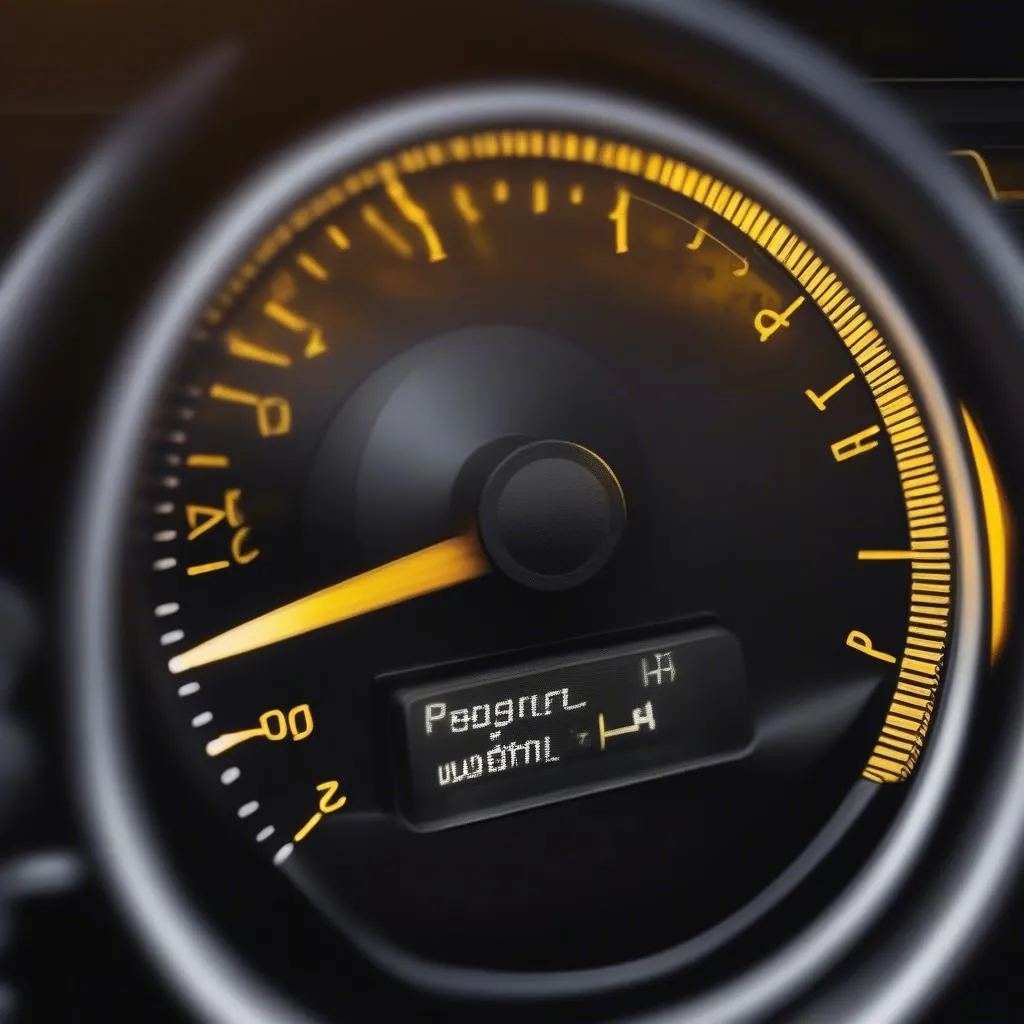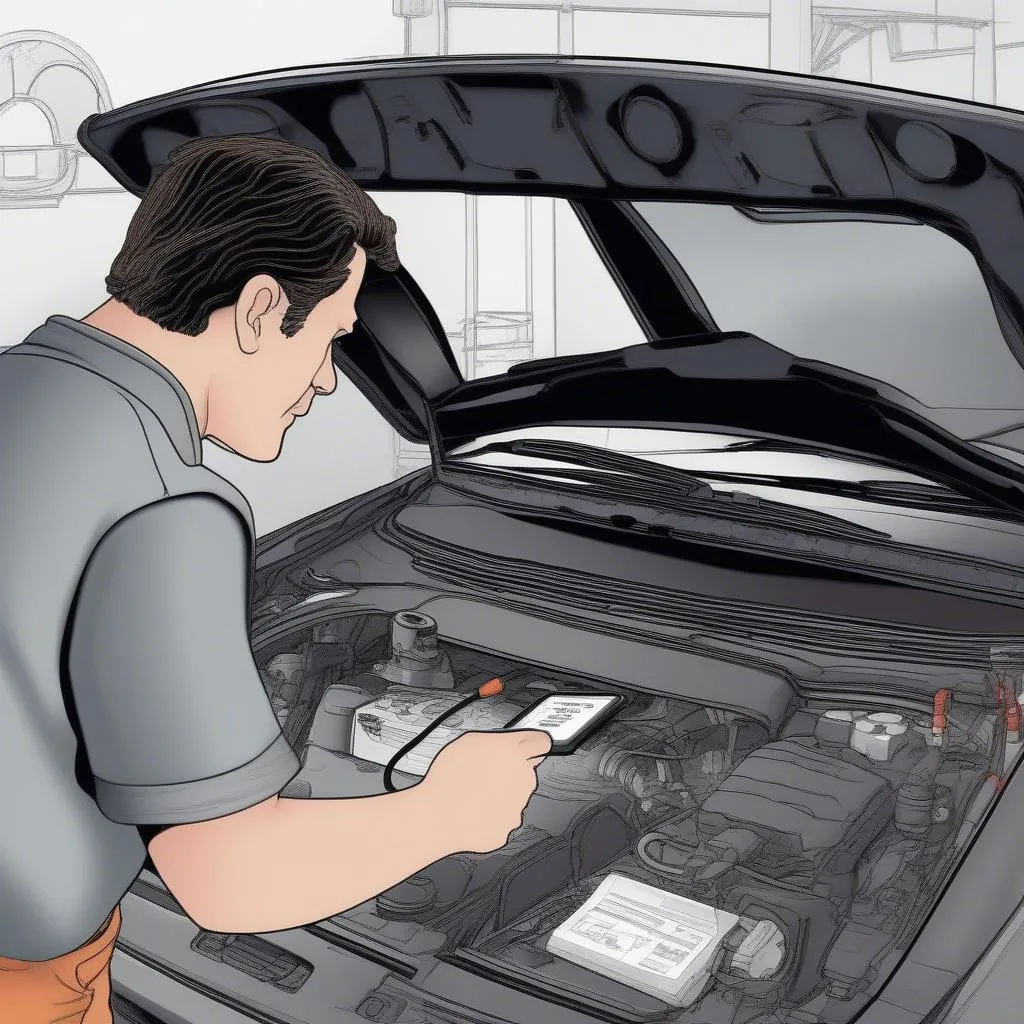Picture this: you’re cruising down Highway 1 in California, windows down, enjoying the Pacific breeze, when suddenly, a yellow light resembling a tiny engine illuminates your dashboard. “Oh no,” you think, “the dreaded check engine light! What does it mean? Is my car about to explode?”
Relax, take a deep breath. While a glowing check engine light can be unnerving, it doesn’t necessarily spell doom for your vehicle. It simply means your car’s onboard computer, the Engine Control Unit (ECU), has detected an issue within one of its many systems. Think of it as your car crying for help, albeit in a cryptic, illuminated way.
Decoding the Distress Signal: What Does “Check Engine Light Causes” Mean?
From a mechanic’s perspective, “check engine light causes” is akin to saying “patient symptoms” – it’s broad and requires further investigation.
Technically, the check engine light illuminates due to a fault code triggered by the ECU. These codes, like secret messages from your car’s inner workings, pinpoint the specific area needing attention.
Economically speaking, understanding the potential “check engine light causes” empowers car owners to anticipate costs and avoid unnecessary panic.
Why is My Check Engine Light On? Unveiling the Culprits
Now, let’s shed some light on the common culprits behind that glowing check engine light:
1. Loose Gas Cap: A Simple Fix with Big Consequences
Believe it or not, a loose or damaged gas cap is one of the most frequent offenders. It disrupts the fuel system’s pressure, causing harmful vapor leaks. Always ensure your gas cap is securely tightened after refueling.
2. Oxygen Sensor Issues: The Silent Emission Saboteur
Your car’s oxygen sensor plays a vital role in monitoring exhaust gases and optimizing fuel efficiency. A malfunctioning sensor can drastically increase emissions and decrease mileage.
3. Catalytic Converter Problems: A Costly Component with a Crucial Role
The catalytic converter transforms harmful exhaust gases into less harmful substances. However, it can fail due to a faulty oxygen sensor, engine misfires, or simply wear and tear. Replacing a catalytic converter can be a significant expense.
4. Mass Airflow Sensor Malfunction: The Air-Fuel Ratio Architect
The mass airflow sensor measures the amount of air entering the engine, crucial for determining the correct air-fuel mixture. A faulty sensor can lead to poor engine performance, reduced fuel economy, and even engine stalling.
5. Spark Plug or Ignition Coil Troubles: The Engine’s Spark of Life
Spark plugs ignite the air-fuel mixture in the cylinders, while ignition coils provide the necessary electrical current. Worn-out spark plugs or faulty ignition coils can cause misfires, leading to reduced engine power and fuel economy.
 car-dashboard-check-engine-light
car-dashboard-check-engine-light
Check Engine Light Scenarios: Real-Life Examples
Imagine Sarah from Texas driving her 2018 Ford Focus when the check engine light appears. Worried, she takes it to a mechanic who discovers a faulty oxygen sensor. Replacing the sensor resolves the issue, restoring her car’s performance and putting her mind at ease.
Or consider John from New York, whose 2015 Honda Accord’s check engine light illuminates after filling up at a gas station in Manhattan. He remembers not tightening the gas cap properly. After securing the cap, the light turns off after a few driving cycles, saving him an unnecessary trip to the mechanic.
Taking Control: What to Do When the Check Engine Light Illuminates
- Don’t Panic: While concerning, a check engine light doesn’t always signify an immediate emergency. However, it’s crucial to address the issue promptly to prevent further damage.
- Note Any Changes: Observe any unusual sounds, smells, or performance issues accompanying the light. This information can assist mechanics in diagnosing the problem.
- Get it Diagnosed: Use a reliable OBD-II scanner to retrieve the specific fault codes stored in your car’s ECU. This provides valuable insights into the root cause of the problem.
- Consult a Professional: If unsure about interpreting the codes or resolving the issue yourself, seek assistance from a qualified mechanic specializing in your car’s make and model.
Frequently Asked Questions: Addressing Your Check Engine Light Concerns
Q: Can I still drive my car with the check engine light on?
A: While it’s possible to drive short distances with the check engine light on, it’s not recommended. Ignoring the warning could lead to more severe damage and costly repairs.
Q: How much does it cost to fix a check engine light issue?
A: The cost varies greatly depending on the underlying cause. A simple fix like a loose gas cap is inexpensive, while a catalytic converter replacement can be quite costly.
Q: Can a faulty battery cause the check engine light to come on?
A: While a weak battery may cause various electrical issues, it typically doesn’t directly trigger the check engine light. However, a failing alternator can cause similar symptoms.
Exploring Related Automotive Concerns
- Car Shaking at Red Light? Learn about the potential causes and solutions for this common car problem. [Link to: https://diagxcar.com/car-shaking-at-red-light/ ]
- Airbag Light Won’t Turn Off? Understand the implications of a persistent airbag light and how to address the issue. [Link to: https://diagxcar.com/airbag-light-wont-turn-off/ ]
- Need a Semi-Truck Code Reader? Discover the best diagnostic tools for heavy-duty vehicles. [Link to: https://diagxcar.com/semi-truck-code-reader/ ]
 car-diagnostics-obd2-scanner
car-diagnostics-obd2-scanner
Need Expert Assistance? We’re Here to Help!
Experiencing car troubles and need help diagnosing those pesky check engine light codes? We understand the frustration of dealing with car issues. Our team of automotive experts is here to provide guidance and support.
Contact us on WhatsApp at +84767531508 for assistance with diagnostic tools and expert advice on resolving your car problems. We’re available 24/7 to help you get back on the road safely.
Drive with Confidence: Understanding Your Car’s Warning Signs
The check engine light, although worrisome, serves as your car’s way of communicating a problem. By understanding its potential causes, taking prompt action, and seeking professional help when needed, you can ensure your vehicle stays healthy, safe, and on the road for miles to come.
We encourage you to share your own check engine light experiences in the comments below and explore other informative articles on our website for valuable car maintenance tips and insights.
Remember, an informed driver is a safer driver!